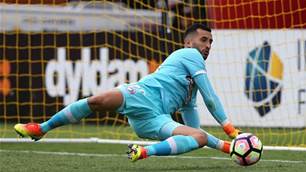The biggest change in the history of the W-League and A-League has been been signed off by club bosses and the FFA – and will overhaul the way the game is governed in Australia.
The New Leagues Working Group has come back with an historic deal that will see the clubs take ownership of the A-League, W-League and Y-League.
A final date of August 1 has been set to draw up the legal paperwork to finalise the deal, but the agreements are now in place for the new set up to kick in in time for this season.
The new spin-off leagues body will take total control of the top tier leagues, with the FFA receiving a licence fee equal to 1.125x what the new league body gives to each club, which will effectively be $4.25m in the first year.
But the FFA will also forgo their licence fee from the new body for the first four years while it establishes itself.
The FFA will also get a 10% cut of any new licence fees for clubs, and a cut of the sale of any club licences, and will also retain a 20% share interest in the new league body but not have any voting rights.
The FFA will also take a 10% cut of any player transfer fees too under the new deal, but clubs will now own all commercial rights and 100% of their intellectual property under the deal.,
The clubs have also sacrificed their right to nominate three members of the FFA's Women's Council and will now just nominate one, with the other two now nominated "independently".
The deal is specifically designed so the FFA will not be any worse off than it currently is financially.
The final contract for the breakaway body will now be drawn up to be approved by the FFA board and Congress next month in time for the new season kick off in October.
A management team from FFA will initially run the league and "evolve rapidly in the coming season and thereafter with clubs committing to providing the necessary capital and human resource investments," said the APFCA in a joint statement.
Club bosses say the deal will now allow them to invest heavily in the A-League's future, but question marks remain over Fox Sports interpretation of the new body.
There are fears the pay TV giant - currently facing a massive squeeze on spending - may see it as an opportunity to walk away from the current TV rights deal which was agreed with the FFA rather than the new independent league body.
But football's leaders today hailed the landmark agreement.
"For the professional game in Australia, and indeed the game as a whole in our country, these recommendations are the foundations for a critically needed evolution and vitalisation," said Australian Professional Football Clubs Association chair, Paul Lederer:
"Once executed they will create the environment for investment and associated opportunities that we all want to see.
"The 12 member clubs of APFCA are focused on completing the NLWG process and beginning the transformation process in earnest.
"Our members are committed to investing in and delivering the elevation of all three of our National Professional Leagues to the status they deserve and the levels that all of the stakeholders of our game rightfully expect. The real work begins now.”
FFA chairman Chris Nikou - who replaced Steven Lowy after the APFCA led a boardroom coup - was also delighted by the deal.
"The recommendations of the NLWG serve to align and unite Australian footballs’ interests like never before," he said today.
"Clubs would have greater control over the strategic and commercial direction of the leagues, in turn triggering significant new investment in the quality and marketing of all three leagues; and FFA would be able to focus its energies and resources on the national teams, grassroots and the overall strategic direction of the game in concert with all of FFA’s members, including the Women’s Football Council, State and Territory Member Federations and Professional Footballers Australia.
"Importantly, FFA would retain influence in key areas of the leagues through the Good of the Game Share."
He added: "I thank the members of the NLWG that have worked tirelessly over many months to produce these recommendations.
"Once finalised, the FFA Board will consider the full details of the proposed reorganisation of the Leagues in accordance with their director’s duties.”
women's Council chair Ros Moriarty hailed the deal as a breakthrough for the game but was keen to see its specifics.
"The unanimous support from Australian football leadership to a commercial restructure of the W-League, A-League and Youth League is a significant step forward," she said.
"The FFA Women's Football Council looks forward to seeing the detail of the deal for W-League in the period before it is ratified, in the context of our charter of equality in football for women and girls.
"We applaud the recognition of the rising value of women's football in reinvigorating the game in Australia and look forward to working closely with the new Leagues management organisation.”
State federations were said to be reluctant to agree a deal that they felt was too heavily weighted in favour of the clubs over grassroots, but today said this deal was for the long term good of the game.
"The Member Federations have appreciated the collaborative way all stakeholders were able to participate in robust discussions towards advancing this significant and necessary evolution in Australian football," said Anter Isaac, Member Federation Council Chair on behalf of all nine state and territory member federations.
"Progress has been achieved because of the commitment we all have to Australian football and by embedding the long-term interests of all its participants at the centre of every discussion.
"The enduring development and support of grassroots and community football, their pathways to the professional leagues and the competitiveness of our national teams must receive the paramount attention and resources they require for the game to prosper.
"Our hope is that this outcome validates the deep and collaborative relationship the stakeholders have with one another, as well as demonstrate to the football family the commitment we all have to the good of the Australian game.”
And Professional Footballers Australia CEO John Didulica added: “This consensus reached between FFA and the clubs is an essential step forward.
"It is now critical that we shift our focus and start designing a footballing future that drives commercial growth, fan engagement and our international competitiveness; through reforming the A-League model, turbo-charging the W-League and ensuring we develop the Y-League into a genuine development pathway.
"It also remains necessary to embed the rights of the players and the position of the PFA in the new governance framework, and we will be working to reach agreement on these matters as a matter of urgency.”
Related Articles

Socceroo-in-waiting seals Championship deal

Fringe Socceroo swerves A-League to remain in Europe after Fulham exit













